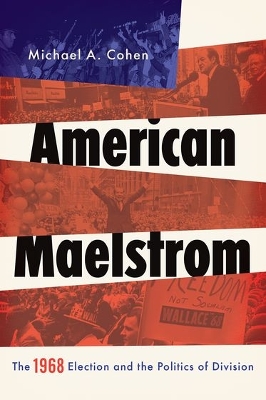Pivotal Moments in World History
1 total work
1968 was a year of turmoil. Economic anxiety was on the rise; racial conflicts were increasingly aggressive as the Black Power movement gained visibility; LBJ's massive bombing campaign had escalated the war in Vietnam; and at home, an emerging counter-culture and vocal feminist movement were declaring war on traditional values. With the assassinations of Martin Luther King, Jr. in April and Robert F. Kennedy in June, the nation teetered on the brink of chaos. It all
culminated in the dramatic presidential race that year, which brought together a dynamic group of politicians vying for the nation's confidence—and resulted in an election that palpably and irrevocably transformed American politics.
In Maelstrom: The 1968 Election and the Politics of Division, Michael Cohen captures the drama of the events leading up to this watershed moment. The political consensus that existed just four years prior had completely disappeared, replaced by division and acrimony on a scale rarely before seen in the country's history. Despite the impressive array of political talent assembled in the presidential election—Johnson, Nixon, Kennedy, Hubert Humphrey, Eugene McCarthy, Nelson Rockefeller,
George Romney, Ronald Reagan and George Wallace—the candidates struggled to appeal to a nation deeply divided by race, class, and values. Cohen traces the new tactics, rhetoric, and issues that emerged in the campaign, from Nixon's so-called Southern Strategy to win over Democrats to Wallace's third-party
run, which caused deep divisions among conservatives and traditional Republicans.
Ultimately, Cohen proves 1968 to be a hinge between the high-water period of 1960s political liberalism to the ascendancy of conservative populism and anti-government attitudes that continue to dominate the nation's political discourse. The political battles in Washington today are being waged on a battlefield constructed in 1968, and in unraveling the complex story of that year, Cohen sketches out the broad lines of American politics over the past four decades.
culminated in the dramatic presidential race that year, which brought together a dynamic group of politicians vying for the nation's confidence—and resulted in an election that palpably and irrevocably transformed American politics.
In Maelstrom: The 1968 Election and the Politics of Division, Michael Cohen captures the drama of the events leading up to this watershed moment. The political consensus that existed just four years prior had completely disappeared, replaced by division and acrimony on a scale rarely before seen in the country's history. Despite the impressive array of political talent assembled in the presidential election—Johnson, Nixon, Kennedy, Hubert Humphrey, Eugene McCarthy, Nelson Rockefeller,
George Romney, Ronald Reagan and George Wallace—the candidates struggled to appeal to a nation deeply divided by race, class, and values. Cohen traces the new tactics, rhetoric, and issues that emerged in the campaign, from Nixon's so-called Southern Strategy to win over Democrats to Wallace's third-party
run, which caused deep divisions among conservatives and traditional Republicans.
Ultimately, Cohen proves 1968 to be a hinge between the high-water period of 1960s political liberalism to the ascendancy of conservative populism and anti-government attitudes that continue to dominate the nation's political discourse. The political battles in Washington today are being waged on a battlefield constructed in 1968, and in unraveling the complex story of that year, Cohen sketches out the broad lines of American politics over the past four decades.
